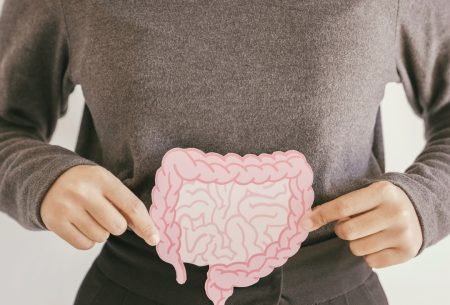This World IBD Day, it’s time to break the taboo around a ‘hidden’ disease that affects as many as 1 in 200 people.
Inflammatory Bowel Disease (IBD) and is considered a lifelong, relapsing disease (going from active to remission and back again) where inflammation and sores (ulcers) in the gut trigger pain, loss of appetite, diarrhoea and fatigue.
There are two main forms of IBD: Crohn’s disease and ulcerative colitis (UC). Crohn’s can occur anywhere along the digestive tract and affects its full thickness, whereas UC is localized to the large intestine and rectum, affecting just the lining of the intestine.
IBD is very different to irritable bowel syndrome (IBS), although some of the symptoms can overlap and some people with IBD can also have IBS.
For those with IBD, I know it doesn’t always feel easy to talk about, but there’s no need to be embarrassed and you don’t need to suffer in silence. There are lots of treatments available that can help those with IBD to continue living life to the fullest. Chat to your healthcare team for advice on diet and lifestyle strategies, and listen to your body so you can spot signs of a flare-up and let yourself rest.
Who does it affect?
IBD can present at any age, but typically between the ages of 15 and 40. Around a quarter are diagnosed before they reach their twenties. It’s more common in Western parts of the world, although numbers in Africa, Asia, the Middle East and South America aren’t far behind, as changes in the environment from industrialisation are thought to trigger the disease in genetically susceptible people.
What are the signs and symptoms?
The main symptoms of IBD include:
-
Severe tummy pain and cramping
-
Diarrhoea and urgency (sometimes including blood, particularly with UC)
-
Unintentional weight loss, from both a loss of appetite and malabsorption of food
-
Feeling really tired and fatigued
How is IBD managed?
For those with ‘active’ disease, when the gut becomes inflamed, it’s always best to work with a gastroenterologist and registered dietitian to get the inflammation under control. This is most often achieved through medical management, although for those with Crohn’s disease there is good evidence for a specific diet therapy known as exclusive enteral nutrition (liquid formula only diet).
Although there are still many unanswered questions, when the disease has stabilized and the inflammation has lowered (known as remission), focusing on a healthy diet and lifestyle may help delay or even prevent disease flare-ups.
What about stress – can it affect IBD?
Managing stress levels can play an important role in helping those with IBD. The evidence so far (albeit it in small studies) demonstrates the role of the gut-brain axis in inflammatory diseases like IBD. This is because our gut and our brain are in constant, two-way communication, so when we’re stressed (because our brain is telling us we are), this can impact our gut too.
Mindfulness and gut-targeted hypnotherapy have both been shown to benefit disease activity and I recommend practising mindfulness, such as with a meditation app, even for just 15 minutes a day to rewire the gut-brain axis.
What about exercise?
Exercise is often overlooked in the management of disease, but IBD guidelines recommend 30 minutes of endurance (e.g. cycling) and resistance (weight-bearing exercise) three times a week. If you’re finding this isn’t possible due to fatigue or other symptoms, it’s worth asking your healthcare team for some support.
At The Gut Health Clinic, I’ve seen the powerful role exercise can play in preventing the downward spiral of fatigue in IBD. Even if you just start with a 10-minute walk each morning, or a set of 10 lunges, squats and elbow dips while watching TV, it can make a difference.
What about diet for people with IBD?
Over 70% of people with IBD report that diet affects their disease, so It’s clear that diet is important. However, identifying specific triggers is a challenge, as the links between IBD and traditional culprits in the Western diet (such as animal fat, salt and refined carbohydrates) aren’t that simple. Instead, it’s been suggested that it could be the processing of food that triggers inflammation in those susceptible (this is something my research team at King’s College London is currently investigating in a world-first trial).
The evidence for treating with diet alone is limited (outside of exclusive enteral nutrition for Crohn’s Disease) and therefore it’s important to focus on diet alongside following your doctor’s advice on medical management.
During a flare-up, protein requirements tend to be higher and, as the intestine can narrow in some people, your healthcare team may advise a low-fibre diet until the inflammation is under control. Some people may also experience short-term lactose intolerance too, so going for low-lactose dairy may be a good idea. Despite the misleading claims out there about cutting out various foods, it’s worth being cautious, as there are often unintended consequences of following a restrictive diet.
During remission (i.e. when the disease isn’t active with fewer or no symptoms), there are a number of things people with IBD can do that are linked with better outcomes (based on observational data, at least):
-
Eat mostly plant-based foods, with plenty of dietary fibre and polyphenols (beneficial plant chemicals)
-
Include something from each food group: fruits, vegetables, wholegrains, meat and alternatives, dairy and alternatives, and healthy fats such as extra virgin olive oil
-
Limit processed foods, cooking from scratch where you can.
In terms of IBD prevention, following a Mediterranean diet, including fresh fruits, vegetables, wholegrains, legumes, fish and extra virgin olive oil has been associated with a reduced risk.
I’ve heard you need to stop eating gluten if you have IBD – what’s the deal?
While some people with IBD say going gluten-free may ease their symptoms, the current evidence is not convincing either way and cutting out gluten cannot cure IBD. This relief may be because of undiagnosed coeliac disease or sensitivity to gluten.
I have a friend or family member with IBD – how can I support them?
It can be difficult for those with IBD to talk to their friends and family about how they’re getting on, but this support can make a big difference. Take some time to read up about IBD using resources, such as from Crohn’s & Colitis UK, however remember everyone can be affected differently. Be there to listen to them and let them know they don’t need to be embarrassed with you, but be patient in case they’re not comfortable opening up straight away. At times, symptoms can be quite unpredictable, so be flexible with plans (including video calls while we’re staying home!) and try to be understanding if they need to change at short notice. You may even be able to help them by picking up their medication.
*This is general information and does not replace the advice of your doctor or other healthcare professional. Always speak to your doctor before making any changes.*













